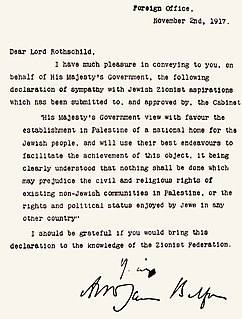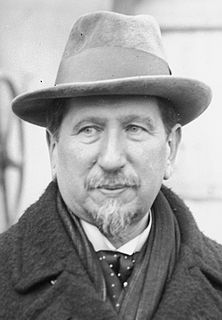
The Balfour Declaration was a public statement issued by the British government in 1917 during World War I announcing support for the establishment of a "national home for the Jewish people" in Palestine, then an Ottoman region with a small minority Jewish population. It read:
His Majesty's government view with favour the establishment in Palestine of a national home for the Jewish people, and will use their best endeavours to facilitate the achievement of this object, it being clearly understood that nothing shall be done which may prejudice the civil and religious rights of existing non-Jewish communities in Palestine, or the rights and political status enjoyed by Jews in any other country.

The United Nations Partition Plan for Palestine was a proposal by the United Nations, which recommended a partition of Mandatory Palestine at the end of the British Mandate. On 29 November 1947, the UN General Assembly adopted the Plan as Resolution 181 (II).

The Yishuv or Ha-Yishuv or Ha-Yishuv Ha-Ivri is the term referring to the body of Jewish residents in the land of Israel prior to the establishment of the State of Israel. The term came into use in the 1880s, when there were about 25,000 Jews living across the Land of Israel, then comprising the southern part of Ottoman Syria, and continued to be used until 1948, by which time there were some 630,000 Jews there. The term is used in Hebrew even nowadays to denote the Pre-State Jewish residents in the Land of Israel.

The 1920 Nebi Musa riots or 1920 Jerusalem riots took place in British-controlled part of Occupied Enemy Territory Administration between Sunday, 4 and Wednesday, 7 April 1920 in and around the Old City of Jerusalem. Five Jews and four Arabs were killed, and several hundred were injured. The riots coincided with and are named after the Nebi Musa festival, which took place every year on Easter Sunday, and followed rising tensions in Arab-Jewish relations. The events came shortly after the Battle of Tel Hai and the increasing pressure on Arab nationalists in Syria in the course of the Franco-Syrian War.

Herbert Louis Samuel, 1st Viscount Samuel, was a British Liberal politician who was the party leader from 1931 to 1935. He was the first nominally-practising Jew to serve as a Cabinet minister and to become the leader of a major British political party. Samuel was the last member of the Liberal Party to hold one of the four Great Offices of State. He also served as a diplomat.

Musa Kazim Pasha al-Husayni held a series of senior posts in the Ottoman administration. He belonged to the prominent al-Husayni family and was mayor of Jerusalem (1918–1920). He was dismissed as mayor by the British authorities and became head of the nationalist Executive Committee of the Palestine Arab Congress from 1922 until 1934. His death was believed to have been caused by injuries received during an anti-British demonstration.

Elections for the Constituent Assembly were held in newly independent Israel on 25 January 1949. Voter turnout was 86.9%. Two days after its first meeting on 14 February 1949, legislators voted to change the name of the body to the Knesset. It is known today as the First Knesset.

First Zionist Congress was the inaugural congress of the Zionist Organization (ZO) held in Basel (Basle), Switzerland, from August 29 to August 31, 1897. 208 delegates and 26 press correspondents attended the event. It was convened and chaired by Theodor Herzl, the founder of the modern Zionism movement. The Congress formulated a Zionist platform, known as the Basel program, and founded the Zionist Organization. It also adopted the Hatikvah as its anthem.

The Zionist Commission for Palestine was a group chaired by Chaim Weizmann, president of the British Zionist Federation following British promulgation of the pro-Zionist, Balfour Declaration of 1917. The Commission was formed in March 1918 and went to Palestine to study conditions and make their recommendations to the British authorities. It consisted of Weizmann with Israel Sieff as secretary, and Joseph Cowen, Dr. M. D. Eder, Leon Simon from Britain; Commandante Angelo Levi Bianchini from Italy; and Professor Sylvian Levy from France. There were no representatives from America or Russia.
Zionism as an organized movement is generally considered to have been founded by Theodor Herzl in 1897. However, the history of Zionism began earlier and is related to Judaism and Jewish history. The Hovevei Zion, or the Lovers of Zion, were responsible for the creation of 20 new Jewish settlements in Palestine between 1870 and 1897.
Socialist Workers Party was a political party in the British Mandate of Palestine from 1919–1922. Its followers were known as Mopsim.

The Assembly of Representatives was the elected parliamentary assembly of the Jewish community in Mandatory Palestine. It was established on 19 April 1920, and functioned until 13 February 1949, the day before the first Knesset, elected on 25 January, was sworn in. The Assembly met once a year to elect the executive body, the Jewish National Council, which was responsible for education, local government, welfare, security and defense. It also voted on the budgets proposed by the Jewish National Council and the Rabbinical Council.

Events in the year 1920 in British-administered Palestine.
The 1933 Palestine riots were a series of violent riots in Mandatory Palestine, as part of the intercommunal conflict in Mandatory Palestine. The riots erupted on 28 October 1933, initiated by the Arab Executive Committee. The riots came as the culmination of Arab resentment at Jewish migration after it surged to new heights following the rise of Nazi Germany, and at the British Mandate authorities for allegedly facilitating Jewish land purchases. The second mass demonstration, at Jaffa in October, turned into a bloodbath when police fired on the thousands-strong crowd, killing 19 and injuring some 70. The "Jaffa massacre", as Palestinians called it, quickly triggered further unrest, including a week-long general strike and urban insurrections that resulted in state security forces killing 7 more Arabs and wounding another 130 with gunfire.
Elections to the Assembly of Representatives were held in Mandate Palestine on 6 December 1925. Around half the votes went to parties associated with trade unions. Ahdut HaAvoda remained the largest party in the Assembly.
Elections to the Assembly of Representatives were held in Mandate Palestine on 5 January 1931. Mapai emerged as the largest party.
The Palestine Arab Congress was a series of congresses held by the Palestinian Arab population, organized by a nationwide network of local Muslim-Christian Associations, in the British Mandate of Palestine. Between 1919 and 1928, seven congresses were held in Jerusalem, Jaffa, Haifa and Nablus. Despite broad public support their executive committees were never officially recognised by the British, who claimed they were unrepresentative. After the British defeat of Ottoman forces in 1918, the British established military rule and (later) civil administration of Palestine. The Palestine Arab Congress and its organizers in the Muslim-Christian Associations were formed when the country's Arab population began coordinated opposition to British policies.

The London Conference (1939), or St James's Palace Conference, which took place between 7 February-17 March 1939, was called by the British Government to plan the future governance of Palestine and an end of the Mandate. It opened on 7 February 1939 in St James's Palace after which the Colonial Secretary, Malcolm MacDonald held a series of separate meetings with an Arab and a Jewish delegation, because the Arab delegation refused to sit in the same room as the Jewish delegation. When MacDonald first announced the proposed conference he made clear that if no agreement was reached the government would impose a solution. The process came to an end after five and a half weeks with the British announcing proposals which were later published as the 1939 White Paper.
This is a timeline of intercommunal conflict in Mandatory Palestine.


















